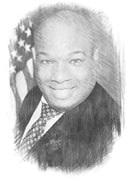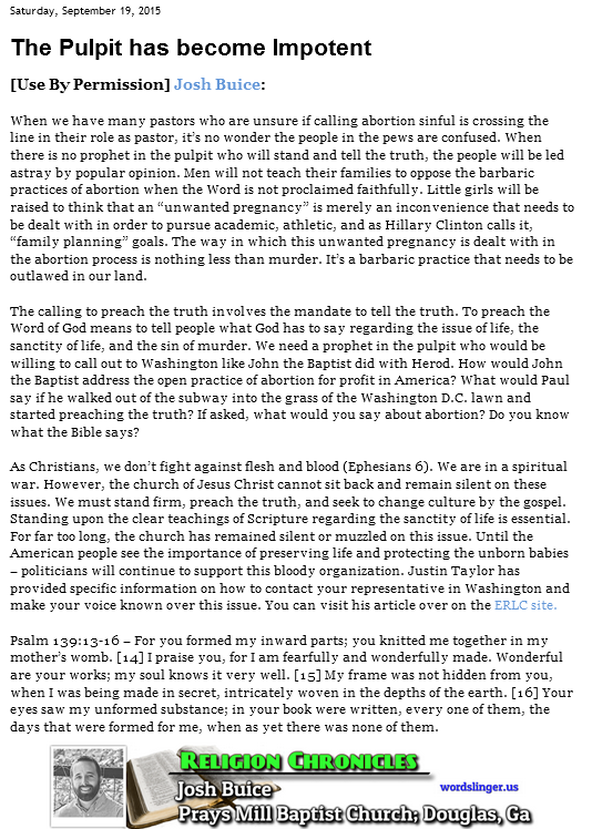- Jamal Bryant - Tom Buck - Mark Buckley - Paul J Bucknell - Mariann Budd - Josh Buice - Brian Burch - Brandon Burden - Aaron Burke - Raymond Burke - Dave Burnett - Mark Burns - AJ Bush - Jennifer Butler - Josh Butler -
==jamal bryant=================
Jamal Harrison Bryant (born May 21, 1971) is an American minister, author and former political candidate. He is the senior pastor of New Birth Missionary Baptist Church. In 2002, Pastor Jamal Bryant founded the Empowerment Temple African Methodist Episcopal Church in Baltimore, Maryland and served for 18 years. In December 2018, he became pastor of New Birth Missionary Baptist Church in Stonecrest, Georgia.
Pastor Jamal Bryant gets new flak for old message claiming Jesus was wrong 85% of His life
Leader of the New Birth Missionary Baptist Church in Stonecrest, Georgia, Jamal Bryant, is getting some new flak for an old message in which he claims Jesus was “wrong” for 85% of His life despite being called, anointed, and chosen. “Jesus accepted His call to ministry at 30. He had been in carpentry since he was 13. He ran the family business since he was 17. At the risk of being heretical tonight, might I suggest to you, that 85% of Jesus's life, He was out of order,” Bryant told congregants at The Chosen Vessel Cathedral in Fort Worth, Texas, at the installation service of Bishop Marvin Sapp as the church’s senior pastor on Nov. 17, 2019, according to a recording of the sermon posted on YouTube. (Leonardo Blair/Christian Post 9/8/23) Read More>>>>>
Leader of the New Birth Missionary Baptist Church in Stonecrest, Georgia, Jamal Bryant, is getting some new flak for an old message in which he claims Jesus was “wrong” for 85% of His life despite being called, anointed, and chosen. “Jesus accepted His call to ministry at 30. He had been in carpentry since he was 13. He ran the family business since he was 17. At the risk of being heretical tonight, might I suggest to you, that 85% of Jesus's life, He was out of order,” Bryant told congregants at The Chosen Vessel Cathedral in Fort Worth, Texas, at the installation service of Bishop Marvin Sapp as the church’s senior pastor on Nov. 17, 2019, according to a recording of the sermon posted on YouTube. (Leonardo Blair/Christian Post 9/8/23) Read More>>>>>
Pastor Jamal Bryant suggests new ‘gospel for grownups’ who are 'used to getting some' sex
Megachurch Pastor Jamal Bryant of New Birth Missionary Baptist Church in Stonecrest, Georgia, has called for the Church to “repackage” itself to include a discussion of a new “gospel for grownups” that doesn’t tell single Christians that are “used to getting some” that they need to be celibate. Speaking in a recent interview with actor and media personality Rashan Ali on her “Cool Soror Podcast,” Bryant argued that if conservative Christians don’t evolve in how they engage the culture on issues such as abortion, sexuality and recreational drugs, like marijuana, megachurches might soon become a thing of the past.
(Christian Post 12/20/22) Read More>>>>>
Megachurch Pastor Jamal Bryant of New Birth Missionary Baptist Church in Stonecrest, Georgia, has called for the Church to “repackage” itself to include a discussion of a new “gospel for grownups” that doesn’t tell single Christians that are “used to getting some” that they need to be celibate. Speaking in a recent interview with actor and media personality Rashan Ali on her “Cool Soror Podcast,” Bryant argued that if conservative Christians don’t evolve in how they engage the culture on issues such as abortion, sexuality and recreational drugs, like marijuana, megachurches might soon become a thing of the past.
(Christian Post 12/20/22) Read More>>>>>
Dec 9, 2022: Relevant: Megachurch Pastor Wants to Grow Weed on Church Property
Atlanta megachurch pastor Jamal Bryant wants to reach the masses, and he’s got an unorthodox strategy to do it.
“New Birth is the largest land-owning Black church in America,” Bryant said. “My position to my deacons is ‘why aren’t we not raising cannabis?”
During a recent appearance on The Cool Soror Podcast with Rashan Ali, the pastor of New Birth Missionary Baptist Church in Georgia made a bold statement: he was looking for male congregants that “smell like weed.”
Atlanta megachurch pastor Jamal Bryant wants to reach the masses, and he’s got an unorthodox strategy to do it.
“New Birth is the largest land-owning Black church in America,” Bryant said. “My position to my deacons is ‘why aren’t we not raising cannabis?”
During a recent appearance on The Cool Soror Podcast with Rashan Ali, the pastor of New Birth Missionary Baptist Church in Georgia made a bold statement: he was looking for male congregants that “smell like weed.”
==tom buck================
April 7, 2021: Religion News Service: Beth Moore apologizes for her role in elevating ‘complementarian’ theology that limits women leaders
The Rev. Tom Buck of First Baptist Church in Lindale, Texas, an outspoken critic of SBC leaders, tweeted that a “plain reading” of a passage from the New Testament Book of 1 Timothy bars women from teaching or preaching the Bible to men in the church.
He was referring to a passage from the Apostle Paul’s letter to Timothy in which he said: “A woman should learn in quietness and full submission. I do not permit a woman to teach or to assume authority over a man; she must be quiet.”
The Rev. Tom Buck of First Baptist Church in Lindale, Texas, an outspoken critic of SBC leaders, tweeted that a “plain reading” of a passage from the New Testament Book of 1 Timothy bars women from teaching or preaching the Bible to men in the church.
He was referring to a passage from the Apostle Paul’s letter to Timothy in which he said: “A woman should learn in quietness and full submission. I do not permit a woman to teach or to assume authority over a man; she must be quiet.”
--mark buckley-----------------------
Mark Driscoll’s Safe Space: How The Embattled Pastor Built A New Church
Driscoll postured himself with humility, recalled Mark Buckley, founding pastor of Living Streams Church, who attended the Scottsdale Bible Church meeting. “He just wanted to say, ‘Hey, I’m here. You’re going to hear stories about me. I made mistakes in the past. I’ve done things wrong. If I restart here, I’m going to do things differently,’” Buckley said. “He was very humble.” Buckley, who had visited Mars Hill Church before in Seattle and was impressed by Driscoll’s uncanny ability to connect with a cynical and skeptical generation of young people, wanted him to succeed. (Chris Moody/ Religion Unplugged 10/2/23) Read More>>>>>
Driscoll postured himself with humility, recalled Mark Buckley, founding pastor of Living Streams Church, who attended the Scottsdale Bible Church meeting. “He just wanted to say, ‘Hey, I’m here. You’re going to hear stories about me. I made mistakes in the past. I’ve done things wrong. If I restart here, I’m going to do things differently,’” Buckley said. “He was very humble.” Buckley, who had visited Mars Hill Church before in Seattle and was impressed by Driscoll’s uncanny ability to connect with a cynical and skeptical generation of young people, wanted him to succeed. (Chris Moody/ Religion Unplugged 10/2/23) Read More>>>>>
--paul j bucknell----------------

After cross-cultural church planting and pastoring for the first two decades of his ministry, the Lord led Paul to establish Biblical Foundations for Freedom in 2000. When serving God's people, Paul began to be sensitized to the need for good biblical and yet practical resources to build up the people of God. Since then he has been actively writing, holding international Christian leadership training seminars and serving in the local church.
"We are good stewards when we understand and cooperate with Christ's purpose." --Paul J Bucknell
 Paul J Bucknell
Paul J Bucknell
" In other words, there is no difficulty that we might face that His glowing love flinches, even for a moment. There is no evil—and even the evil that evolves into oppressive darkness—that can smudge, darken, or stamp out God’s love.
This is why the truth of God’s abiding love is such a powerful truth. When we hear a tempting voice suggest, “Would a loving God allow this?” know for sure that you have an answer. This is why the Psalmist in Psalm 118 lists so many aggravated difficulties but still ends up with the same answer and truth he began with, “His lovingkindness is everlasting.” --Paul J. Bucknell; Biblical Foundations for Freedom
This is why the truth of God’s abiding love is such a powerful truth. When we hear a tempting voice suggest, “Would a loving God allow this?” know for sure that you have an answer. This is why the Psalmist in Psalm 118 lists so many aggravated difficulties but still ends up with the same answer and truth he began with, “His lovingkindness is everlasting.” --Paul J. Bucknell; Biblical Foundations for Freedom
--mariann budde-----------------------
 Mariann Budde
Mariann Budde
“I am among those who believe weapons of war don’t belong in the hands of civilians. We’ve just been lulled into this sense of false helplessness that I find to be one of the greatest manifestations of sin that we need to fight against. We will look back on these days and wonder how it was that we could have been so collectively aligned to such a needless proliferation of weapons meant to take human life." --Mariann Budde 8.6.19
==Josh Buice===================
|
July 8, 2021: Capstone Report: Ed Litton is an unrepentant liar and this interview proves it
And Justin Peters posting on the Reformation Charlotte YouTube page said, “Unnamed sources? My name is Justin Peters. Let’s add to my name the names of Gabriel Hughes, Jeff Maples, Jordan Hall, Tom Buck, Tom Ascol, Josh Buice, Phil Johnson, and literally dozens upon dozens of others who have been talking about this (along with their names) for at least 2 weeks now. There, fixed it.” Josh Buice is serving as the Pastor of Pray’s Mill Baptist Church located in Douglasville, Ga. He is married to his wife Kari and we has four children. He earned his M.Div. and D.Min. in expository preaching from the school of theology at The Southern Baptist Theological Seminary. He and his wife are originally from Douglasville, Ga. They were both members of Pray’s Mill as children and crossed paths in the children’s ministries of our church. After God’s call on their lives for the gospel ministry, they moved to Louisville to attend the Seminary. After a few months, Josh was called to be the pastor of Van Buren Baptist Church. God moved their family to serve in McMinnville, TN at Cornerstone Baptist Church four years later. Today, they are seeking to be obedient to God and desire to serve the people of Pray’s Mill.
|
==brian burch===============
DOJ must defend churches from more expected pro-abortion attacks, Catholic leader says
A prominent Catholic organization is calling on the Department of Justice to defend Catholic churches from anticipated pro-abortion attacks, pointing to the disparities in the DOJ’s enforcement of a law protecting both abortion clinics and churches. In a letter first obtained by The Daily Signal, CatholicVote President Brian Burch calls on Attorney General Merrick Garland to detail what steps the DOJ plans to take to “combat the incessant attacks against Catholic churches.” “How much more violence needs to happen before you will act?” he asks Garland. “Why is the FACE Act being enforced against Holocaust survivors, but not [against] those who attempt to destroy churches or even kill Catholics?”
(The Lion; 4/10/24) READ MORE>>>>>
A prominent Catholic organization is calling on the Department of Justice to defend Catholic churches from anticipated pro-abortion attacks, pointing to the disparities in the DOJ’s enforcement of a law protecting both abortion clinics and churches. In a letter first obtained by The Daily Signal, CatholicVote President Brian Burch calls on Attorney General Merrick Garland to detail what steps the DOJ plans to take to “combat the incessant attacks against Catholic churches.” “How much more violence needs to happen before you will act?” he asks Garland. “Why is the FACE Act being enforced against Holocaust survivors, but not [against] those who attempt to destroy churches or even kill Catholics?”
(The Lion; 4/10/24) READ MORE>>>>>
==brandon burden=============
Churches are breaking the law and endorsing in elections, experts say. The IRS looks the other way.
For nearly 70 years, federal law has barred churches from directly involving themselves in political campaigns, but the IRS has largely abdicated its enforcement responsibilities as churches have become more brazen about publicly backing candidates.”.Six days before a local runoff election last year in Frisco, a prosperous and growing suburb of Dallas, Brandon Burden paced the stage of KingdomLife Church. The pastor told congregants that demonic spirits were operating through members of the City Council
(Jeremy Schwartz/Texas Tribune 10/30/22)
READ MORE>>>>>
For nearly 70 years, federal law has barred churches from directly involving themselves in political campaigns, but the IRS has largely abdicated its enforcement responsibilities as churches have become more brazen about publicly backing candidates.”.Six days before a local runoff election last year in Frisco, a prosperous and growing suburb of Dallas, Brandon Burden paced the stage of KingdomLife Church. The pastor told congregants that demonic spirits were operating through members of the City Council
(Jeremy Schwartz/Texas Tribune 10/30/22)
READ MORE>>>>>
==aaron burke===========
AARON BURKE: ‘CHRISTIANS DON’T HAVE THE RIGHT TO PREACH TO PEOPLE THAT THEY HAVEN’T PRAYED FOR FIRST’
Aaron Burke emphasized that Christians don’t have the right to preach to people they haven’t prayed for first. The lead pastor of Radiant Church (Tampa Bay, Florida), Aaron Burke, discussed ways to share one’s faith. According to him, one thing that Christians could do for those who haven’t encountered God was to pray for them. “Prayer is the most powerful way to invite God into a relationship, whether it’s a friend or a coworker or a spouse. If you want to see God change their life, pray for them,” he highlighted.
(Church Learning 4/25/24) READ MORE>>>>>
Aaron Burke emphasized that Christians don’t have the right to preach to people they haven’t prayed for first. The lead pastor of Radiant Church (Tampa Bay, Florida), Aaron Burke, discussed ways to share one’s faith. According to him, one thing that Christians could do for those who haven’t encountered God was to pray for them. “Prayer is the most powerful way to invite God into a relationship, whether it’s a friend or a coworker or a spouse. If you want to see God change their life, pray for them,” he highlighted.
(Church Learning 4/25/24) READ MORE>>>>>
--raymond burke-----------------
Raymond Leo Burke (born June 30, 1948) is an American cardinal prelate of the Roman Catholic Church. He serves as the patron of the Sovereign Military Order of Malta, a position widely interpreted as a demotion from his previous position as Cardinal Prefect of the Supreme Tribunal of the Apostolic Signatura, which he held until November 2014. Burke previously served as the archbishop of the Archdiocese of St. Louis, Missouri (2003–2008) and as the bishop of the Diocese of La Crosse, Wisconsin (1994–2003). He is a prominent canon lawyer and is often perceived as a voice of conservatism in the Roman Catholic Church and American politics.
Aug 16, 2021: Friendly Athiest: Herman Mehta: Anti-Vaxxer Catholic Cardinal Currently on Ventilator After Catching COVID
Mar 27, 2015: Religion News Service: Cardinal Raymond Burke: Gays, remarried Catholics, murderers are all the same
When Pope Francis last year effectively demoted U.S. Cardinal Raymond Burke by moving him out of a senior post in the Vatican to a largely ceremonial role as head of a Rome-based Catholic charity, it was viewed as a way to sideline one of the pontiff’s most outspoken critics on the right.
Mar 27, 2015: Religion News Service: Cardinal Raymond Burke: Gays, remarried Catholics, murderers are all the same
When Pope Francis last year effectively demoted U.S. Cardinal Raymond Burke by moving him out of a senior post in the Vatican to a largely ceremonial role as head of a Rome-based Catholic charity, it was viewed as a way to sideline one of the pontiff’s most outspoken critics on the right.
==dave burnett===============
Jan 22, 2023: Fox News: Atheist group accuses Indiana sheriff's office of 'pushing Christianity' on inmates after hundreds baptized
On Dec. 29, the sheriff's office posted photos on its Facebook page of dozens of inmates being baptized.
"What a great way to celebrate Christmas and a New Year! DCDC Chaplain Dave Burnett along with REC members baptized nearly 40 men and women after a personal, public profession of Jesus Christ in their lives," the post said.
On Dec. 29, the sheriff's office posted photos on its Facebook page of dozens of inmates being baptized.
"What a great way to celebrate Christmas and a New Year! DCDC Chaplain Dave Burnett along with REC members baptized nearly 40 men and women after a personal, public profession of Jesus Christ in their lives," the post said.
--mark burns--------------------------

John Mark Burns (born September 21, 1979) is an American evangelical minister, televangelist and political candidate who is the pastor of the Harvest Praise & Worship Center in South Carolina. He was an early supporter of Donald Trump during the 2016 United States presidential election and by 2023 was a board member of Pastors for Trump. Burns unsuccessfully ran for the United States House of Representatives in South Carolina's 4th congressional district in 2018 and 2022. He is co-founder of the NOW Television Network
Faithful America inducts 12 more into its ‘false prophets’ hall of fame
This year’s inductees, listed in alphabetical order, are: Mark Burns, televangelist and regular speaker on the ReAwaken America Tour. Time Magazine called “Donald Trump’s Top Pastor” in 2016. He is currently a board member of Pastors for Trump. On the ReAwaken America Tour, he regularly declares “war on Satan and every race-baiting Democrat” and uses the Bible to threaten explicit political violence. He frequently tells crowds, “This is a God nation, this is a Jesus nation, and you will never take my God and my gun out of this nation.” . (Baptist News Global Staff/Baptist News Global 11/6/23)
Read More>>>>>
This year’s inductees, listed in alphabetical order, are: Mark Burns, televangelist and regular speaker on the ReAwaken America Tour. Time Magazine called “Donald Trump’s Top Pastor” in 2016. He is currently a board member of Pastors for Trump. On the ReAwaken America Tour, he regularly declares “war on Satan and every race-baiting Democrat” and uses the Bible to threaten explicit political violence. He frequently tells crowds, “This is a God nation, this is a Jesus nation, and you will never take my God and my gun out of this nation.” . (Baptist News Global Staff/Baptist News Global 11/6/23)
Read More>>>>>
|
Over 12K Sign Christian Petition Condemning 'False Prophet' Mike Johnson In response to Mike Johnson recently becoming the new House speaker, over 12,000 people have signed a Christian petition condemning the congressman as a "false prophet" among other Republican Party members. Faithful America, an online Christian group that supports social justice causes, released their second-annual "False Prophets Don't Speak for Me" campaign featuring a list of top Christian-nationalist leaders in both church and politics along with a petition on Tuesday. The list, which in addition to Johnson, identifies former President Donald Trump, pastor Mark Burns, self-proclaimed prophet affiliated with the New Apostolic Reformation (NAR) Julie Green, Fox News host Laura Ingraham, Ohio Representative Jim Jordan, conservative activist and radio talk show host Charlie Kirk, pastor Jackson Lahmeyer, Texas' Lieutenant Governor Dan Patrick, Archbishop Carlo Viganò, self-proclaimed prophet affiliated with NAR Lance Wallnau, and co-founder of Moms for Liberty and school board chair in Sarasota, Florida, Bridget Ziegler as "false prophets." (Natalie Venegas/Newsweek 11/4/23) Read More>>>>> |

May 15, 2023:
Following are a few of the most bizarre things that was preached last night at the REAwaken Tour, which is essentially a Christian Nationalist Lovefest for Donald, the sexual predator, Trump. Michael Flynn's remarks (below) are dehumanizing and dangerous.
MAGA cultists gathered at The Trump National Doral resort last night for a "Pastors For Trump" event that kicked off with a prayer asking God to "intervene in the affairs of this nation" by giving Trump "divine wisdom" and "divine discernment."
Self proclaimed "Prophet" Amanda Grace, in one of the most bizarre messages, warned of technologically advanced “mermaids and water people” spreading perversion and told the crowd, “we are meant for hand to hand combat.”
Ex-American Idol contestant and Flat-Earther right-wing activist Jimmy Levy resurrected a conspiracy theory that was championed by QAnon. These people are drinking the blood of children," Levy proclaimed. "These (Hollywood) people are injecting a chemical called adrenochrome that they extract from children that are scared." (apparently because he was on American Idol he is an expert on all things Hollywood ¯\_(ツ)_/¯).
Pastor Mark Burns cited the Bible to suggest that violence is needed to take power: "You got to get to the point where you realize that when they smack you in the face you smack them back two times harder," Burns said, quoting Matthew 5:38-40, which reads, "If anyone slaps you on the right cheek, turn to them the other cheek also." He then suggested violence as he noted that the "Bible says the violent take it... and we take it by force," in reference to Matthew 11:12, which reads, "And from the days of John the Baptist until now, the Kingdom of Heaven suffereth violence, and the violent take it by force.""We are here ready to take this nation back," said Burns during the event this week. "And I believe without a shadow of a doubt, the only man that God has anointed him...to be the next President of the United States of America and that is Donald Trump. That's why we got to declare war on this transgender agenda that tried to destroy our children's minds in the United States of America."
Michael Flynn weighed in, of course: "The other side is an ideology that they don't have faith. They don't believe in God. They have no soul. They have no consciousness......When we think about something, we go, you know, black and white right and wrong, good and evil. They don't see things like that. They don't see in those terms."
Baptist Pastor Brian Kaylor said that Flynn's comment is a "dangerous dehumanizing rhetoric," and that he's "painting this as a battle between God's people & soulless creatures."
If they can keep pushing the idea that anyone left of them is soul-less..........they are doing the same thing Hitler did in German with the Jews. Soul-less people are easier to kill. And they will do it to purify whatever race or creed they are claiming. Last night, after he cancelled his Iowa rally, Trump called Michael Flynn and told him he would "bring him back" in his next administration. The "Reawaken" tour came to the Trump National Doral Miami for a three-day conference.
Following are a few of the most bizarre things that was preached last night at the REAwaken Tour, which is essentially a Christian Nationalist Lovefest for Donald, the sexual predator, Trump. Michael Flynn's remarks (below) are dehumanizing and dangerous.
MAGA cultists gathered at The Trump National Doral resort last night for a "Pastors For Trump" event that kicked off with a prayer asking God to "intervene in the affairs of this nation" by giving Trump "divine wisdom" and "divine discernment."
Self proclaimed "Prophet" Amanda Grace, in one of the most bizarre messages, warned of technologically advanced “mermaids and water people” spreading perversion and told the crowd, “we are meant for hand to hand combat.”
Ex-American Idol contestant and Flat-Earther right-wing activist Jimmy Levy resurrected a conspiracy theory that was championed by QAnon. These people are drinking the blood of children," Levy proclaimed. "These (Hollywood) people are injecting a chemical called adrenochrome that they extract from children that are scared." (apparently because he was on American Idol he is an expert on all things Hollywood ¯\_(ツ)_/¯).
Pastor Mark Burns cited the Bible to suggest that violence is needed to take power: "You got to get to the point where you realize that when they smack you in the face you smack them back two times harder," Burns said, quoting Matthew 5:38-40, which reads, "If anyone slaps you on the right cheek, turn to them the other cheek also." He then suggested violence as he noted that the "Bible says the violent take it... and we take it by force," in reference to Matthew 11:12, which reads, "And from the days of John the Baptist until now, the Kingdom of Heaven suffereth violence, and the violent take it by force.""We are here ready to take this nation back," said Burns during the event this week. "And I believe without a shadow of a doubt, the only man that God has anointed him...to be the next President of the United States of America and that is Donald Trump. That's why we got to declare war on this transgender agenda that tried to destroy our children's minds in the United States of America."
Michael Flynn weighed in, of course: "The other side is an ideology that they don't have faith. They don't believe in God. They have no soul. They have no consciousness......When we think about something, we go, you know, black and white right and wrong, good and evil. They don't see things like that. They don't see in those terms."
Baptist Pastor Brian Kaylor said that Flynn's comment is a "dangerous dehumanizing rhetoric," and that he's "painting this as a battle between God's people & soulless creatures."
If they can keep pushing the idea that anyone left of them is soul-less..........they are doing the same thing Hitler did in German with the Jews. Soul-less people are easier to kill. And they will do it to purify whatever race or creed they are claiming. Last night, after he cancelled his Iowa rally, Trump called Michael Flynn and told him he would "bring him back" in his next administration. The "Reawaken" tour came to the Trump National Doral Miami for a three-day conference.
--aj bush------------------------

AJ Bush, originally from Colorado and previously based in rural Wyoming, moved to the area after Bishop Karen Oliveto, who leads all seven districts in the faith’s Mountain Sky Conference, appointed her as the new pastor of First United Methodist Church and Centenary United Methodist Church. She replaces the Rev. Elizabeth McVicker, who is now the United Methodist Church’s Utah/Western Colorado District superintendent. Bush started her new position in July 2020, and she has been leading the estimated 25 members of Centenary United Methodist Church and around 50 members of downtown Salt Lake City’s First United Methodist Church simultaneously through weekly livestreamed services.
Feb 16, 2023: ABC4: A moral obligation’: Religious leaders call on Utah lawmakers to save Great Salt Lake
“Just like the Great Salt Lake is fed by many different streams, we are many different streams of faith, but we have come together around this one issue,” said Pastor AJ Bush, representing the First United Methodist Church.
“Just like the Great Salt Lake is fed by many different streams, we are many different streams of faith, but we have come together around this one issue,” said Pastor AJ Bush, representing the First United Methodist Church.
--jennifer butler----------------------

May 16, 2023:
National and state Christian leaders spoke out against the white supremacist ideology espoused during two recent Christian nationalist rallies in South Florida. Christians Against Christian Nationalism and Faithful America organized a livestreamed event as a counter perspective to the May 11 “Pastors for Trump” reception and the May 12 ReAwaken America Tour rally, both held at the Trump Doral resort in Miami. “We are here today as Christians who are horrified to see the faith we hold dear being used to spread lies, violence and authoritarian theocracy,” said Amanda Tyler, executive director of Baptist Joint Committee for Religious Liberty and lead organizer of Christians Against Christian Nationalism. Tyler was joined at All Angels Episcopal Church in Miami Springs by Nathan Empsall of Faithful America, Russell Meyer of the Florida Council of Churches, Jennifer Butler of Faith in Public Life Action, James Golden of Pastors for Florida Children and Charles Toy of The Christian Left. More at Baptist News Global
National and state Christian leaders spoke out against the white supremacist ideology espoused during two recent Christian nationalist rallies in South Florida. Christians Against Christian Nationalism and Faithful America organized a livestreamed event as a counter perspective to the May 11 “Pastors for Trump” reception and the May 12 ReAwaken America Tour rally, both held at the Trump Doral resort in Miami. “We are here today as Christians who are horrified to see the faith we hold dear being used to spread lies, violence and authoritarian theocracy,” said Amanda Tyler, executive director of Baptist Joint Committee for Religious Liberty and lead organizer of Christians Against Christian Nationalism. Tyler was joined at All Angels Episcopal Church in Miami Springs by Nathan Empsall of Faithful America, Russell Meyer of the Florida Council of Churches, Jennifer Butler of Faith in Public Life Action, James Golden of Pastors for Florida Children and Charles Toy of The Christian Left. More at Baptist News Global
--josh butler--------------------
May 4, 2023: Baptist News Global: Author of controversial book on sex as ‘icon of salvation’ resigns his pastorate
Josh Butler, co-lead pastor at Redemption Church in Tempe, Ariz., is author of the much-debated new book Beautiful Union. After The Gospel Coalition published an excerpt of the book online March 1, the criticism was so rapid and so intense that the article was taken down less than 24 hours later.
Josh Butler, co-lead pastor at Redemption Church in Tempe, Ariz., is author of the much-debated new book Beautiful Union. After The Gospel Coalition published an excerpt of the book online March 1, the criticism was so rapid and so intense that the article was taken down less than 24 hours later.
March 4, 2023: Christian Post: The Gospel Coalition takes down 'Sex Won't Save You' article; Rick Warren calls for apology
The Gospel Coalition faced calls for an apology Friday over a now-deleted post on its website in which the author discusses salvation and the Church in the context of sexual intercourse that some critics say approaches erotic literature.
Authored by Arizona Pastor Josh Butler, the article published on Wednesday, originally titled "Sex Won’t Save You (But It Points to the One Who Will)," is an excerpt from Butler’s book, Beautiful Union released last month.
The Gospel Coalition faced calls for an apology Friday over a now-deleted post on its website in which the author discusses salvation and the Church in the context of sexual intercourse that some critics say approaches erotic literature.
Authored by Arizona Pastor Josh Butler, the article published on Wednesday, originally titled "Sex Won’t Save You (But It Points to the One Who Will)," is an excerpt from Butler’s book, Beautiful Union released last month.






